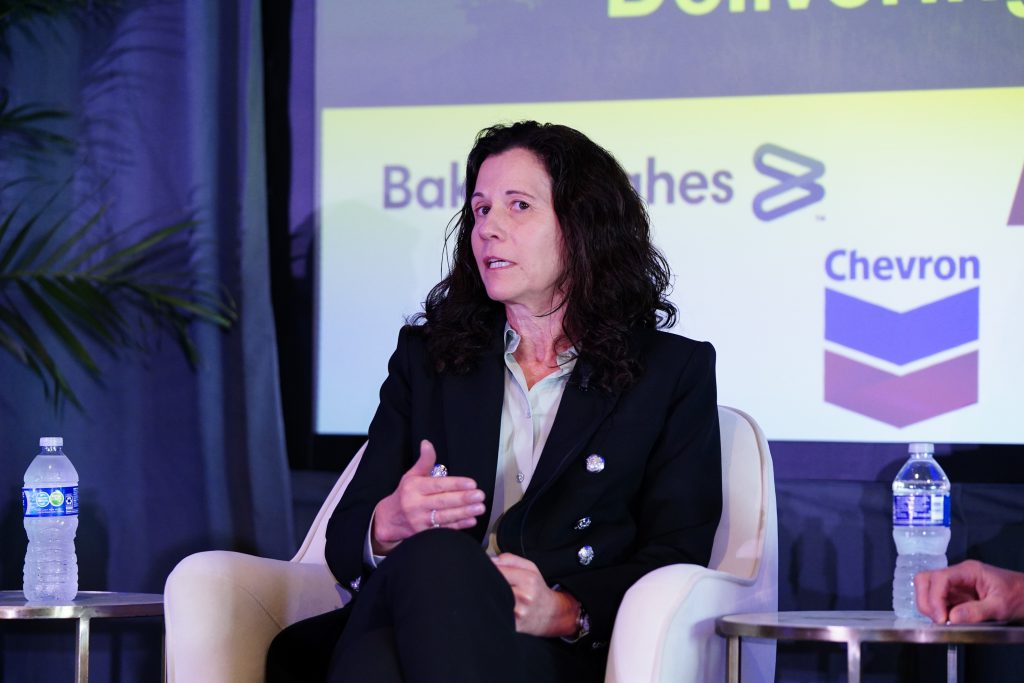
Energy Workforce hosted a panel of North American Onshore Operators during the 2023 Annual Meeting, who discussed the state of the industry from an E&P perspective. More than 200 executives from energy services and technology companies heard them speak during the event in Austin.
The panel was moderated by Energy Workforce Advisory Board Member Jim Wicklund, Managing Director, Client Relations & Business Development, PPHB, and included panelists Michael DeShazer, VP Business Units, Coterra Energy; Julia Gwaltney, SVP & COO, Ranger Oil Corporation; Steve Pruett, President & CEO, Elevation Resources; and Mohit Singh, EVP & CFO, Chesapeake Energy Corporation.
After noting that everyone on the panel began their careers as engineers, Wicklund launched into the discussion with a question to the panel about the status of the oil business.

“I think its an interesting time,” DeShazer said. “Today, we’ve learned a lot about frack optimization and well spacing, and we’ve delineated and we are developing all of our major basins in the U.S. Now the conversation is shifting, what does the runway look like, what do our inventories look like, and how do we develop our tier one or tier two assets?”
Gwaltney agreed, stating that it is a pivotal time with her company.
“We are always drilling the very best well today, and we know tomorrow we have to deliver the same return. How do we continue to take that inventory and do even better? We are going to be leaning into technology, but unfortunately, we are really stretched on workforce.”
Julia Gwaltney, Ranger Oil Corporation
Pruett echoed the sentiment and added that he doesn’t want to see layoffs and office closings similar to what happened during the pandemic.
“The need for stability and deployment in our industry is so important,” Pruett said. “That is why it is critical to ensure we invest in the relationships with our service partners who execute everything we do.”
Gwaltney also discussed working with industry partners.
“The beauty of our business is that it’s a very entrepreneurial business,” she said. “We can stand side by side with multinational companies as well as mom and pop shops.” Gwaltney also noted the regulatory challenges facing the industry and its impacts on smaller companies within the sector.
“It’s more challenging as more regulations come into play. Access to capital is limited, and its more difficult for smaller companies.”
The panelists also discussed inventory, capital expenditures and strategically pushing new or expanding on projects.
When looking at depth of inventory, Singh said, “Consolidation has to happen. The reason why it is important is when you put two portfolios together, the synergies in terms of capital allocations changes. When you have combined assets, it allows for reallocating to the best locations and project.”
All panelists acknowledged the workforce challenges facing the industry. DeShazar discussed recruiting new talent and perceived risks, but also the opportunities.
“Our industry is developing in different ways. For instance, in digitalization and data sciences, where I believe is an area of recruitment. I think that the tech cycles we are currently seeing with layoffs at Google, Facebook and Amazon will have an impact. There is the potential for volatility in every industry, and what is going on in tech right now gives us an opportunity to recruit and attract great talent.”
Michael DeShazer, Coterra Energy
To wrap up the panel, Wicklund asked what the speakers believed could be the most amazing thing to happen this year. Panelists said they hoped sentiment about the industry shifts more positively due to Russia’s invasion of Ukraine, and that recruitment picks up with new graduates entering the industry.
Pruett added he would like to see reforms from Congress.
“If the Senate passes NEPA reform, that would be the most amazing thing,” he said. “It’s not just for our industry but for renewables and all kinds of infrastructure projects that we need in order to perform.”
Corry Schiermeyer, Senior Director Communications, writes about governmental policies for the Energy Workforce & Technology Council. Click here to subscribe to the Energy Workforce newsletter, which highlights sector-specific issues, best practices, activities and more.




